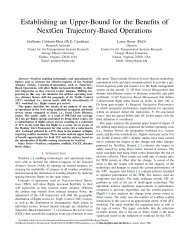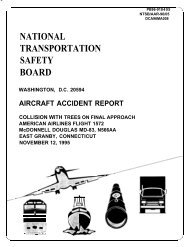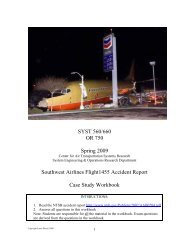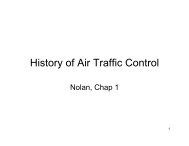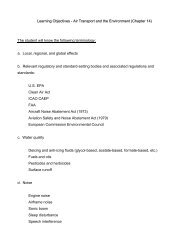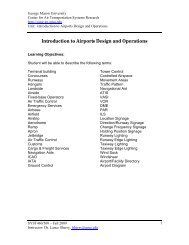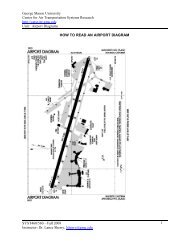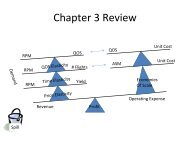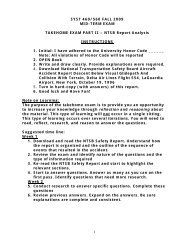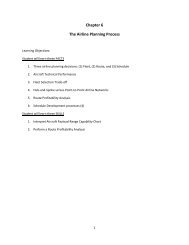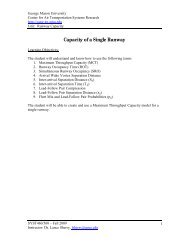Air Traffic Management Concept Baseline Definition - The Boeing ...
Air Traffic Management Concept Baseline Definition - The Boeing ...
Air Traffic Management Concept Baseline Definition - The Boeing ...
You also want an ePaper? Increase the reach of your titles
YUMPU automatically turns print PDFs into web optimized ePapers that Google loves.
“System designers, regulators, and operators should recognize that over-reliance<br />
(on automation) happens and should understand its antecedent conditions and<br />
consequences”<br />
(Parasurman, 1997)<br />
This dependency can be expected to grow not only as a function of time and confidence<br />
in the system, but it can also be expected to grow as a function of lack of knowledge of<br />
how the system functions without the presence of that support. Thus, new (relatively<br />
naive) operators who do not have the same skill and experience base as the existing<br />
operators, can be expected to display dependency quicker than operators who have this<br />
pre-support experience. Growing dependency has implications on how the system copes<br />
with failures, errors and exceptions. <strong>The</strong>refore it is essential that such dependency is<br />
accounted for not only in the development, design and implementation stages but also<br />
during the certification procedures where issues of availability, reliability and redundancy<br />
are raised.<br />
<strong>The</strong> second issue to be raised about decision support systems is how they affect the<br />
operator’s ability to maintain the necessary level of situational awareness. A key aspect of<br />
situational awareness is the ability to identify when intervention is necessary and then<br />
intervene as required.<br />
Controllers formulate a ‘tactical plan’ which is constantly being executed and modified in<br />
real time. This tactical plan is their baseline for actions within their domain of<br />
responsibility. <strong>The</strong> plan demands that certain information is accessed and processed in a<br />
timely manner. If the necessary information is not available, then this absence is itself a<br />
trigger to change tactics. Thus triggers to tactical actions can be derived from the absence<br />
or presence of information. This knowledge of what should be present, but is not, would<br />
have to be explicit in the support tool design; lack of required information requires some<br />
form of ‘flag’.<br />
<strong>The</strong> whole aspect of situational awareness, what it is, where it comes from, what<br />
information is needed when (in order to support it), is still not adequately understood. To<br />
place decision support systems into such a domain of incomplete knowledge is an action<br />
that should be treated with great caution.<br />
Most aspects of these two issues can be addressed using a series of questions about the<br />
proposed new process or tool:<br />
• Has the level of expected dependency on the new support tool by new operators been<br />
identified<br />
• What is its availability - how often is it prone to fail<br />
• What is its reliability - what are the situations when its output is highly variable<br />
• What online checks are being made on its reliability - are these continuous or periodic<br />
• Is it the human operator that verifies the output If so, is this operator capable of<br />
making those reliability checks<br />
49




